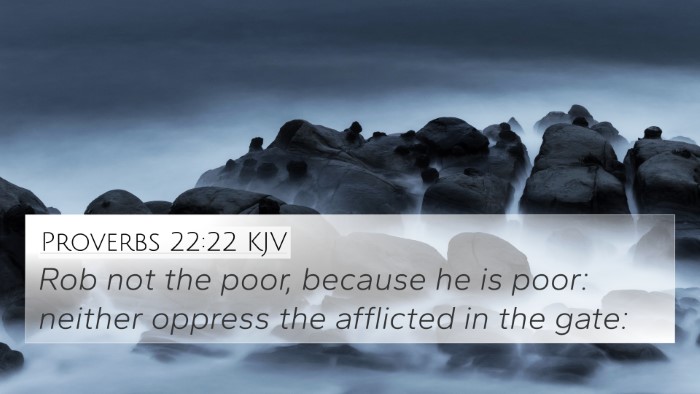Understanding Proverbs 24:7
Proverbs 24:7 states, "Wisdom is too high for a fool: he openeth not his mouth in the gate." This verse speaks to the value of wisdom and the inherent qualities of a fool, particularly in social and communal settings.
Summary of Insights
The following insights are drawn from public domain commentaries to elucidate the meaning of this verse:
-
Matthew Henry's Commentary:
Henry emphasizes that wisdom is invaluable, signifying a higher understanding that a fool cannot grasp. The 'gate' symbolizes public discourse or decision-making, wherein the wise contribute meaningfully, whereas the fool remains silent, indicating his lack of comprehension.
-
Albert Barnes' Notes:
Barnes notes that the term 'fool' here describes someone who acts thoughtlessly and fails to appreciate or pursue wisdom. He stresses the contrast between wisdom and foolishness, highlighting that true wisdom often involves silence and discretion, particularly in communal situations.
-
Adam Clarke's Commentary:
Clarke observes that wisdom should be sought earnestly, as it not only elevates one’s understanding but also one’s social standing. The fool’s silence in the 'gate' underscores his recognition of his limitations, even if he does not possess the wisdom to articulate them.
Key Themes in Proverbs 24:7
This verse touches on several important themes:
- Value of Wisdom: Understanding the importance of wisdom in life.
- Foolishness: Recognizing and differentiating foolish behavior.
- Social Discourse: The role of wisdom in community interaction and decision-making.
- Silence: The significance of knowing when to speak and when to remain silent.
Cross References for Proverbs 24:7
For a deeper understanding, here are Bible verses that relate to Proverbs 24:7:
- Job 28:12-13 - Discusses the inaccessibility of wisdom.
- Proverbs 1:7 - Highlights the fear of the Lord as the beginning of knowledge.
- Proverbs 17:28 - Affirms the wisdom found in remaining silent.
- Ecclesiastes 5:2 - Advises on the nature of silence before God.
- Proverbs 18:2 - Describes a fool's disinterest in understanding.
- James 1:19 - Encourages being quick to listen and slow to speak.
- Proverbs 15:2 - Emphasizes the speech of the wise compared to the fool.
- Proverbs 13:20 - Encourages companionship with the wise.
- Matthew 7:6 - Discusses discerning when to share wisdom.
- Colossians 4:6 - Encourages gracious and wise communication.
Thematic Connections
Proverbs 24:7 fits within broader biblical themes that connect wisdom with action and communication:
- Connections between Bible verses highlight the continuity of wisdom's significance throughout Scripture.
- Linking Bible scriptures like Proverbs 1:7 and Proverbs 18:2 illustrates the recurrent admonition against folly.
- Using a biblical concordance or a cross-reference Bible study could further enhance understanding of these themes.
Tools and Methods for Cross-Referencing
For those seeking to delve deeper, here are some methods and tools for Bible cross-referencing:
- Utilizing a Bible concordance allows for the easy identification of related verses.
- A Bible cross-reference guide can aid in finding thematic connections.
- Employing a cross-reference Bible study method encourages exploration of inter-Biblical dialogues.
- Resources like Bible reference sources and comprehensive cross-reference materials can assist in understanding biblical nuances and connections.
User Intent Queries
Users may explore questions such as:
- What verses are related to Proverbs 24:7?
- Find cross-references for Proverbs 24:7 to enhance its interpretation.
- How do Proverbs 24:7 and Proverbs 1:7 connect thematically?
- Discover similarities between Proverbs 24:7 and Ecclesiastes 5:2.
- Identify Bible verses that support the wisdom outlined in Proverbs 24:7.
Conclusion
Proverbs 24:7 invites readers to reflect on the importance of wisdom in their lives and communities. By understanding the insights from prominent commentaries and exploring related scriptures, one can appreciate the depth of biblical teachings on wisdom, folly, and communication.

















